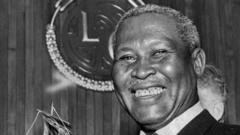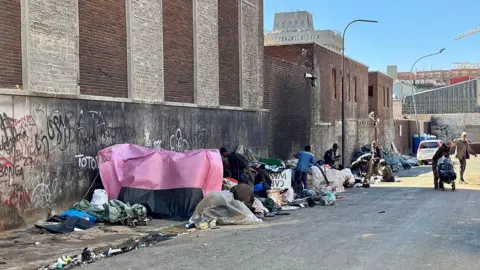South Africa is set to rekindle its search for truth as a court prepares to re-examine the circumstances surrounding the death of Chief Albert Luthuli, a pivotal figure in the anti-apartheid struggle and the first African recipient of the Nobel Peace Prize. Initially ruled an accident in 1967, activists and Luthuli's descendants have consistently raised doubts about the official narrative, sparking renewed interest for validation and justice nearly six decades later.
Luthuli was reported to have been struck by a train while walking along railway tracks. The 1967 inquest concluded that there was no evidence of foul play by railway employees or others involved. However, many have speculated that Luthuli, who was the leader of the African National Congress (ANC) during apartheid restrictions, may have been murdered.
The National Prosecuting Authority (NPA) recently announced it would present new evidence in the hopes of overturning the original findings. Although they have not disclosed the details of this evidence, the NPA's decision has been met with optimism, especially from Luthuli's family.
Albert Mthunzi Luthuli, the late leader's grandson, expressed relief regarding the reopening of the investigation, reflecting on the disappointment in how the Truth and Reconciliation Commission handled apartheid-era crimes. He remarked on the loss of potential witnesses and suspects over the years, indicating challenges ahead but emphasizing the importance of pursuing truth for justice.
In conjunction with Luthuli's case, the justice system will also review the murder of Mlungisi Griffiths Mxenge, another anti-apartheid figure whose death in 1981 failed to lead to accountability due to prior TRC amnesty. This simultaneous reopening underscores a broader desire to confront past injustices and provide closure for the victims and their families.
The renewed inquests into Luthuli’s and Mxenge’s deaths come at a time when South Africa grapples with understanding its apartheid legacy and ensuring that the memories of those who fought against it are not forgotten. As the country continues to navigate its post-apartheid identity, these inquiries spotlight a critical need for reflection and acknowledgment of historical grievances.
Luthuli was reported to have been struck by a train while walking along railway tracks. The 1967 inquest concluded that there was no evidence of foul play by railway employees or others involved. However, many have speculated that Luthuli, who was the leader of the African National Congress (ANC) during apartheid restrictions, may have been murdered.
The National Prosecuting Authority (NPA) recently announced it would present new evidence in the hopes of overturning the original findings. Although they have not disclosed the details of this evidence, the NPA's decision has been met with optimism, especially from Luthuli's family.
Albert Mthunzi Luthuli, the late leader's grandson, expressed relief regarding the reopening of the investigation, reflecting on the disappointment in how the Truth and Reconciliation Commission handled apartheid-era crimes. He remarked on the loss of potential witnesses and suspects over the years, indicating challenges ahead but emphasizing the importance of pursuing truth for justice.
In conjunction with Luthuli's case, the justice system will also review the murder of Mlungisi Griffiths Mxenge, another anti-apartheid figure whose death in 1981 failed to lead to accountability due to prior TRC amnesty. This simultaneous reopening underscores a broader desire to confront past injustices and provide closure for the victims and their families.
The renewed inquests into Luthuli’s and Mxenge’s deaths come at a time when South Africa grapples with understanding its apartheid legacy and ensuring that the memories of those who fought against it are not forgotten. As the country continues to navigate its post-apartheid identity, these inquiries spotlight a critical need for reflection and acknowledgment of historical grievances.



















